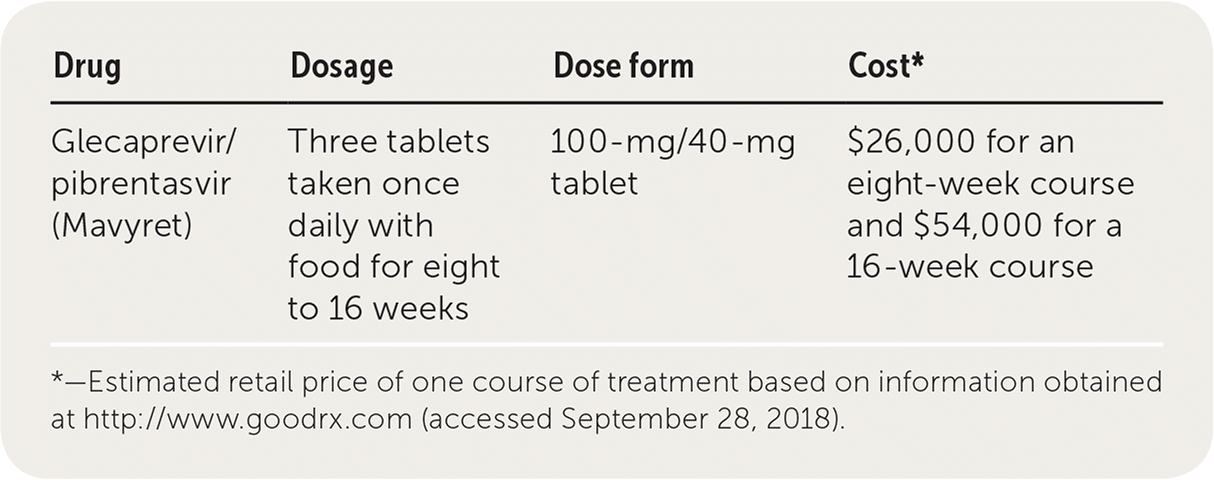
Am Fam Physician. 2018;98(10):601-602
Author disclosure: No relevant financial affiliations.
Glecaprevir/pibrentasvir (Mavyret) is a combination of a hepatitis C virus (HCV) NS3/4A protease inhibitor and an HCV NS5A inhibitor. It is labeled for the treatment of chronic HCV genotype 1, 2, 3, 4, 5, or 6 infection in patients without cirrhosis or with compensated cirrhosis based on the Child-Pugh class A criteria. Glecaprevir/pibrentasvir is also labeled for the treatment of adult patients with HCV genotype 1 infection who have previously been treated with a regimen containing either an HCV NS5A inhibitor or an NS3/4A protease inhibitor, but not both.1

| Drug | Dosage | Dose form | Cost* |
|---|---|---|---|
| Glecaprevir/pibrentasvir (Mavyret) | Three tablets taken once daily with food for eight to 16 weeks | 100-mg/40-mg tablet | $26,000 for an eight-week course and $54,000 for a 16-week course |
Safety
Glecaprevir/pibrentasvir has been shown to be relatively safe. As with other antiviral agents in this class, the greatest safety concern is that it may reactivate hepatitis B virus (HBV) in coinfected patients. This occurs in up to 24% of patients with chronic HBV infection and in 1% to 4% of those with resolved HBV infection, and can lead to fulminant hepatitis, hepatic failure, and death.1,2 Although no participants in premarketing studies experienced reactivation, patients should be monitored for HBV reactivation during and after treatment. Glecaprevir/pibrentasvir is not recommended for patients with moderate to severe hepatic impairment (Child-Pugh class B and C). Glecaprevir/pibrentasvir has the potential to interact with several drugs, such as rifampin, atazanavir (Reyataz), carbamazepine (Tegretol), efavirenz (Sustiva), and St. John's wort.3 Glecaprevir/pibrentasvir can increase the effect of dabigatran (Pradaxa); prescribers should refer to the pharmaceutical label of dabigatran for dosing instructions. In patients taking warfarin (Coumadin), glecaprevir/pibrentasvir may cause fluctuating international normalized ratios. It has not been evaluated in pregnant or breastfeeding women or in children.
Tolerability
Glecaprevir/pibrentasvir is generally well tolerated. The most commonly reported adverse effects are nausea (8%), fatigue (11%), and headache (13%). These effects occurred more often than with placebo but are similar to effects reported with other hepatitis C medications. In clinical trials, only 0.1% of patients discontinued treatment with glecaprevir/pibrentasvir because of adverse effects.1
Effectiveness
Based on 11 studies of 2,397 patients who had not been previously treated for HCV infection, between 93% and 100% of patients with HCV genotype 1, 2, 3, 4, 5, or 6 infection and compensated liver disease will achieve sustained virologic response or undetectable HCV viral load with glecaprevir/pibrentasvir therapy.3 This therapy is similarly effective in patients previously treated with peginterferon, ribavirin (Rebetol, Virazole), and/or sofosbuvir (Sovaldi), and in patients with compensated cirrhosis or with no cirrhosis.1 Lack of detectable HCV viral load is a proxy for cure; there are no data about direct effects on patient-oriented outcomes of morbidity or mortality.
Glecaprevir/pibrentasvir has not been compared directly with other treatments available in the United States. As with other antiviral therapies, no long-term studies have evaluated the effect of glecaprevir/pibrentasvir on quality of life, progression of liver dysfunction, or delaying mortality.
Price
The cost of eight to 16 weeks of treatment with glecaprevir/pibrentasvir ranges from $26,000 to $54,000, depending on duration. This is substantially less expensive than similar drugs used to treat hepatitis C such as sofosbuvir/velpatasvir (Epclusa) and sofosbuvir/velpatasvir/voxilaprevir (Vosevi), which cost about $74,000 (12-week treatment), and ledipasvir/sofosbuvir (Harvoni), which costs approximately $94,000 (12-week treatment).
Simplicity
The required dosage of glecaprevir/pibrentasvir is three tablets taken once daily with food. Duration of therapy is eight weeks for patients without cirrhosis who have not been previously treated, and 12 to 16 weeks for all other patients. Before treatment, patients should be tested for evidence of current or previous HBV infection by measuring hepatitis B surface antigen and hepatitis B core antibody. No dosage adjustment is needed for patients with renal impairment.1
Bottom Line
Glecaprevir/pibrentasvir is an effective treatment for any of six genotypes of HCV infection and has few adverse effects. It can be used to treat more genotypes over a shorter duration (eight weeks for patients without cirrhosis) and is substantially less expensive than other available treatments.
